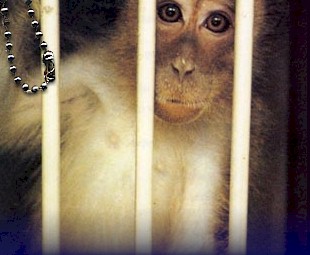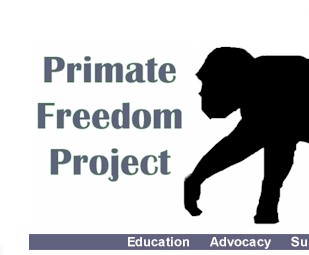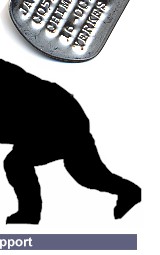r90128 was the 128th rhesus macaque
born at the Wisconsin Regional Primate Research Center (WRPRC) in
1990. His mother was r85004 (the 4th rhesus macaque born in 1984
at WRPRC); his father was rhaa56, a monkey acquired by WRPRC elsewhere.
r90128 was born on September 15th; he weighed a little over a pound.
During the first days of his life he was assigned briefly to a taxpayer-funded
study titled: Development and Regulation of Emotion in Primates
(Grant# 5R01MH046729). This study continues today at WRPRC. The
researcher, Ned Kalin, uses an acid to burn a part of the brain
involved in emotional responses. It is unknown how r90128 was used
in this experiment.
In 1991, r90128 was assigned to a study on the effects of staphylococcus
toxins.
In 1992, r90128 was assigned to a study on the rare simian immunovirus
(SIV). They began drawing blood regularly.
On September 1, 1993, r90128 was assigned to the study: Mucosal
Infection with SIV
On September 12, he underwent a colon lavage. Essentially, he was
given an enema, and the liquefied contents of his colon were sucked
out. This is likely a part of the Mucosal Infection with SIV study.
He seems not to have been successfully infected with SIV, but whether
this was an experimental failure or whether he was used as a control
animal in the study is unknown.
On September 4, 1994, r90128 was assigned to the study: Immunobiology
of SIV Infection (Grant# 5P51RR000167). The researcher, M. Salvato
wrote: “We screened 56 uninfected monkeys … We predicted
that SIV infection would be cleared rapidly in animals with high
env-specific lytic activity and slowly in animals with low lytic
activity. Accordingly, we infected 11 animals and found the opposite
of our prediction to hold true…” Exactly how r90128
was used was undisclosed by WRPRC.
On September 1, 1994, r90128 was assigned to the project: Immunobiology
of SIV and SHIV. SHIV (simian/human immunovirus) is an invention
of primate laboratories. Pieces of the human immunovirus, HIV, are
mated with pieces of a rare monkey virus SIV, to produce an entirely
new-to-the-world organism, SHIV.
On September 4, 1995, r90128 was reported to be having "soft/loose
feces."
On September 6, 1995, he was reported to be "beaten up."
On September 9, 1995, he was reported to have a cut on his left
hand.
On September 11, 1995, r90128 was assigned to the project: Sweet
Taste in Primates and had a small portion of his tongue cut out.
On January 8, 1996, r90128 was assigned to the project: Caloric
Restriction and Aging. The researcher using him was Richard Weindruch.
On February 13, 1996, r90128 had "watery stools."
On March 11, 1996, r90128 was assigned to: Dietary Restriction and
Aging, a project of the director's, Joe Kemnitz. He keeps the monkeys
in his experiments quite hungry for years on end.
On April 4, 1996, he was reassigned to Richard Weindruch's study
and had an identification chip implanted into his right arm above
the wrist.
On May 15, 1996, r90128 was reassigned to the project: Immunobiology
of SIV and SHIV.
February 12, 1997, back to: Caloric Restriction and Aging.
On August 13, 1997, r90128 was assigned to the project: Study of
Age-Related Bone Changes in Male and Female Monkeys.
On September 5, 1997, he was used in the study: Skeletal Effects
of Therapeutic Anticoagulation Administration.
On September 19, 1997, r90128 had "two small cuts near right
nostril."
On January 27,1998, r90128 was used in the project: Ctl Response
in an SIV Infection of the Rhesus Macaque.
On the following day, January 28, 1998, J. Murphy used him in the
project: Restraint, Anesthesia and Physical Examination of Non-Human
Primates.
On July 27, 1998, the remark is made: "[E]valuated animal for
weight loss; animal is bright, alert and responsive; no dehydration
or history of diarrhea noted; re-evaluate after august weight; -
by c.e." Then, "august weight shows weight gain; animal
bright, alert, responsive and hydrated; resolve case." C.E.
probably refers to Carol Emerson, a research veterinarian.
On May 20, 1999, r90128 was assigned to the project: DNA Profiling
of Primates Used in Biomedical Research.
On or about August 8, 2000, r90128 seems to have lost his appetite.
From the documents: "Intact canines. Not eating. Leaving large
amounts of chow in cage. No abnormalities observed recently. Moved
to this cage 3 weeks ago. If reports persist recheck weight to ensure
maintaining."
On August 12, 2000, he was assigned to the project: Regulation of
Food Intake in Rhesus Monkeys. The remark was made: "inappettance
10-19 thru 10-22. Reported for inappettance; bright, alert, responsive
and hydrated at present and eating; if condition persists get current
weight and reassess. Not eating 10-23 thru 10-25. Left large amount
of chow in cage; appears bright, alert, responsive, and hydrated;
is defecating; monitor for inappettance and obtain current weight."
On August 24, 2000, the remark was made: "several reports for
not eating; weight gain observed; care staff suggests chow not being
removed for cage; contact investigator. Not eating well 11-10, 11-11.
Mens." The "investigator" refers to the researcher
using r90128 in his or her experiments. The remark, "Mens."
is very odd in this context. Mens. is nearly always a notation for
menses or menstruation. But r90128 is a male.
On January 31, 2001, r90128 underwent surgery to implant a tube
into the third ventricle of his brain.
On February 13, 2001, an infection developed around the edge of
the cap glued to the top of his skull. The remark was made: "surgery
on 1-31; headcaps require more maintenance than after caps; animal
picks at margin and is not eating well; cavity at cranial end of
implant; culture collected; nor eating well; plan: collect cbc/chem.;
discuss headcap with pi. (PI refers to "primary investigator"
the person being paid to experiment on r90128.
The last entry for r90128 notes that an antibiotic ointment is being
applied to the infection.
During the ten years following his unfortunate birth at WRPRC,
r90128 has been moved to a different cage at least 62 times, destroying
any possibility of establishing even a limited sense of well-being
through familiarity with his environment. During the ten years following
his unfortunate birth, r90128 has been injected with Ketamine at
least 20 times and has had blood drawn at least 24 times.
This information comes directly
from documents reluctantly surrendered by WRPRC to one person
with the courage and compassion to keep asking questions. WRPRC
has tried to intimidate those who have written with concern about
individual monkeys locked away and being experimented on there.
Evidence continues to accumulate almost daily about the profound
similarities that exist in the minds and emotions of humans and
the primates being experimented on in the nation's laboratories.
Only the most bigoted, or ignorant, can continue to claim that the
horrors being visited upon these unfortunate victims are, in any
sense, less morally repugnant than they would be if the victims
were human children. Just as we would have a moral obligation to
speak out upon learning that such tortures were being conducted
on our neighbors' children, so to do we have an obligation to speak
out for the monkeys who are being frightened, harmed, and killed
today.
It is due to the compassion and effort of Andrea Schwartz that we
have learned a little about the sad life of r90128.
r90128, our thoughts are with you.
Home Page | Our Mission | News
What Are Primate Freedom
Tags | Order Tag
Primate Research
Centers | Resources
|






